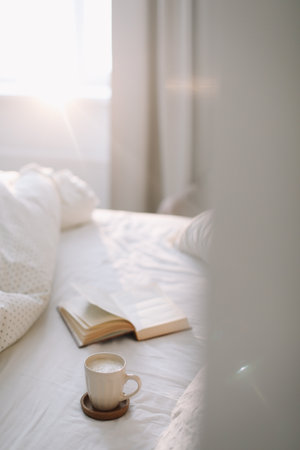Understanding Feng Shui Principles for UK Context
Feng Shui, an ancient Chinese philosophy of harmonising individuals with their surroundings, finds fresh relevance when adapted to the unique characteristics of British homes. For couples in the UK, understanding the foundational principles of Feng Shui means more than simply rearranging furniture; it involves recognising how energy—known as “qi”—flows within traditional British architecture. Many UK bedrooms are compact, often featuring period details such as bay windows, fireplaces, or sloping ceilings, which can pose both challenges and opportunities for effective Feng Shui. The core tenets focus on balance, orientation, and the interplay between elements such as wood, metal, earth, water, and fire. In a British context, this might mean making use of natural light through sash windows or optimising the placement of the bed to avoid direct alignment with doors—a common layout in Victorian and Edwardian terraces. By blending these time-honoured principles with an appreciation for local building styles and spatial constraints, couples can create a bedroom environment that nurtures connection and supports restful living.
Choosing the Right Colours for Harmony
When it comes to Feng Shui in small UK bedrooms, selecting the right colours is both an art and a science. The aim is to create an environment that fosters calm, intimacy, and positive energy—qualities especially vital for couples sharing limited space. British light conditions and popular décor preferences should guide your choices. In the UK, natural light can be scarce, particularly during autumn and winter months. Thus, opting for hues that uplift yet soothe the spirit is essential.
Calming & Auspicious Colours: A Feng Shui Perspective
According to Feng Shui principles, soft, neutral tones are generally most harmonious for bedrooms. However, you can incorporate gentle touches of auspicious colours to enhance romance and well-being. Below is a practical table suggesting colour options and their benefits:
| Colour | Feng Shui Benefit | UK Décor Trend | Suggested Use |
|---|---|---|---|
| Pale Blue | Promotes tranquility and restfulness | Classic British; pairs well with period features | Bedding, feature wall, curtains |
| Soft Green | Symbolises renewal and health | Popular in botanical-inspired schemes | Cushions, throws, plants |
| Warm White/Cream | Encourages clarity and peace | Mainstay in minimalist and Scandi styles | Main wall colour or furniture finish |
| Pale Pink/Peach | Cultivates romance and affection | Subtle touch in accessories for modern homes | Lampshades, artwork accents, bedding trims |
| Moss or Sage Green | Grounds energy; connects with nature | Ties with cottagecore & rustic trends | Rugs, cushions, window frames |
| Dove Grey | Adds stability without feeling heavy | Timeless across contemporary UK interiors | Bed linen, carpets, wardrobes |
Adapting to UK Light Conditions
The famously overcast British weather means that north-facing bedrooms can appear cool or shadowy. For these spaces, prioritise warmer shades like cream or soft peach to add cosiness. In south-facing rooms blessed with more sunlight, muted blues or greens help balance the brightness while maintaining serenity.
Tips for Couples: Blending Tastes & Trends
- Avoid overly vibrant or harsh colours (e.g., bright red or electric blue), as these can disrupt sleep and harmony.
- If one partner prefers bold accents, introduce them sparingly through removable décor items such as cushions or artwork.
- Choose finishes with a matte or satin sheen to diffuse light softly rather than creating glare.
Incorporating Local Flair
- Avoid overly vibrant or harsh colours (e.g., bright red or electric blue), as these can disrupt sleep and harmony.
- If one partner prefers bold accents, introduce them sparingly through removable décor items such as cushions or artwork.
- Choose finishes with a matte or satin sheen to diffuse light softly rather than creating glare.
Incorporating Local Flair
Integrate traditional British elements—such as floral prints or tartan—in subtle ways that echo your chosen Feng Shui palette. Ultimately, thoughtful colour selection honours both Eastern wisdom and Western style for a harmonious shared bedroom retreat.

3. Furniture Placement and Storage Solutions
Arranging furniture thoughtfully is essential for both maintaining the flow of positive energy and ensuring harmony between couples, especially in the typically compact bedrooms found across the UK. When it comes to positioning your bed, tradition suggests placing it against a solid wall with a clear view of the door, yet not directly in line with it. This is believed to invite stability and security into your relationship, while also keeping your personal sanctuary shielded from disruptive energy. Avoid situating the bed beneath windows or sloping ceilings, as this can create an unsettled atmosphere.
In smaller British homes, storage often becomes a challenge, but clutter is one of Feng Shui’s greatest adversaries. Opt for under-bed storage boxes with lids to keep items neatly out of sight and maintain a sense of calm. Choose wardrobes and chests that are proportional to the room—bulky furniture can overwhelm the space and hinder energy flow. If possible, select dual-purpose furniture, such as ottoman beds or bedside tables with drawers.
Keep pathways around the bed clear on both sides to encourage equality and ease of movement for both partners. This not only fosters balance in your relationship but also allows energy to circulate freely. For couples sharing modest-sized bedrooms in Victorian terraces or new-build flats, wall-mounted shelves can offer practical storage without encroaching on floor space.
Lastly, avoid stacking belongings high above wardrobes or behind doors; these hidden heaps can contribute to subconscious stress and hinder restful sleep. By being intentional with your furniture arrangement and clever with your storage solutions, you’ll create a harmonious retreat that reflects both modern British living and timeless Feng Shui wisdom.
4. Maximising Natural Light and Ventilation
In the UK, where overcast skies and limited sunlight are part of daily life, making the most of available natural light is crucial—especially in smaller bedrooms shared by couples. According to Feng Shui principles, good natural light and air circulation invite positive chi (energy) into the space, promoting harmony and well-being for both partners.
Utilising Curtains Wisely
Opt for light-coloured, sheer curtains that allow daylight to filter through while still providing privacy. Heavy drapes can block valuable sunlight; instead, consider layering with blinds or voile panels that can be easily adjusted throughout the day. During brighter hours, draw curtains wide open to maximise the influx of natural energy.
Strategic Mirror Placement
Mirrors are a classic Feng Shui tool and work wonders in British bedrooms where light is at a premium. Place mirrors on walls opposite or adjacent to windows to reflect daylight deeper into the room. However, avoid positioning mirrors directly facing the bed, as this can disrupt restful energy during sleep.
| Element | Feng Shui Purpose | UK Practical Tip |
|---|---|---|
| Curtains | Soften harsh energy & control light flow | Select pale colours; use sheer layers for flexibility |
| Mirrors | Amplify light & energy flow | Hang opposite windows but not facing the bed directly |
| Window Placement | Optimise entry of natural chi | If remodelling, favour larger south-facing windows; otherwise, keep sills uncluttered and clean to encourage maximum daylight penetration |
Enhancing Air Flow with Window Management
Fresh air is another key aspect of Feng Shui. In many UK homes, double glazing is common and essential for warmth, but remember to open windows regularly—even for short bursts—to refresh the bedroom’s atmosphere. If privacy or security is a concern, consider window restrictors or vented locks so that you can enjoy air circulation without compromising safety.
Synthesising Light and Air for Positive Chi
Together, these techniques help transform a compact British bedroom into a harmonious retreat. By embracing local conditions and adapting Feng Shui wisdom—using practical tools like curtains, mirrors, and mindful window management—couples can foster an environment where positive energy circulates freely, supporting restful sleep and a balanced relationship.
5. Adding Personal Touches Without Clutter
Infusing your small bedroom with meaningful décor is an essential aspect of Feng Shui, particularly for couples in the UK who wish to create a harmonious sanctuary without overwhelming limited space. The key lies in balancing personal touches with a sense of calm and order, as clutter can disrupt energy flow and affect the relationship dynamic.
Choose Meaningful Items Thoughtfully
Select just a few cherished objects that symbolise your bond—perhaps framed photographs from memorable holidays along the Cornish coast, or a piece of art that both partners adore. Opt for items that evoke positive memories and reinforce your connection, rather than filling shelves with miscellaneous trinkets. In keeping with British sensibilities, consider heirlooms or handcrafted accents that tell your shared story.
Display with Intention
Rather than scattering keepsakes about the room, designate a specific area—a floating shelf above the bed or a small bedside table—to display these special pieces. This approach helps maintain visual tranquillity while allowing each item to shine, embodying the less-is-more ethos common in many UK homes.
Keep Surfaces Clear
Avoid overcrowding surfaces such as window sills or dressers. Instead, rotate displays seasonally or for special occasions. This not only keeps the space fresh but also ensures that each object retains its significance and does not contribute to unnecessary clutter.
Incorporate Soft Textiles and Natural Elements
Introduce personal flair through soft furnishings like cushions in tartan or linen throws that reflect your personalities without dominating the room. A small vase of fresh blooms from a local market or a potted plant can also enhance positive energy while offering a nod to Britain’s love of nature, all without taking up much space.
By curating meaningful décor and keeping clutter at bay, UK couples can foster intimacy and harmony in their compact bedrooms, turning even the smallest space into a nurturing retreat guided by Feng Shui principles.
6. Coping with Common UK Challenges
UK homes, with their unique architecture and sometimes quirky features, can pose particular challenges when trying to achieve harmonious Feng Shui in a small bedroom. However, with a dash of creativity and practical know-how, you can address these issues while preserving positive energy flow.
Solutions for Dampness
Damp is a frequent concern in many British homes, especially in older properties. To counteract the negative energy that damp can bring, ensure good ventilation by opening windows regularly or investing in a dehumidifier. Opt for natural materials such as cotton or linen for bedding and curtains, which allow the room to breathe. Place a few indoor plants like peace lilies or English ivy, known for their air-purifying qualities, but avoid water-heavy plants that might exacerbate moisture problems. Keep walls clear of mould and repaint with light, uplifting colours to invite fresh Qi.
Maximising Small Wardrobes
Small wardrobes are another staple of traditional UK bedrooms. Decluttering is essential—only keep items you use and love. Consider space-saving storage solutions such as under-bed drawers or multi-purpose furniture. Use baskets or boxes inside your wardrobe to maintain order and reduce stagnant energy caused by overcrowding. Mirrors on wardrobe doors can expand the sense of space but be mindful not to position them directly opposite the bed, in line with Feng Shui principles.
Tackling Awkward Alcoves
Alcoves, sloped ceilings, and odd corners are common in British homes, especially Victorian terraces or converted lofts. Rather than seeing them as obstacles, transform alcoves into useful spaces: add floating shelves for books or decorative items that bring joy, or tuck a cosy reading chair there to create a nurturing retreat. Ensure no sharp corners (or poison arrows) point towards the bed; soften these with fabric drapes or rounded furniture where possible.
Maintaining Positive Feng Shui Amidst Constraints
The key is to embrace what makes your home unique while respecting core Feng Shui tenets—clear pathways for movement, balanced elements, and personalised touches that make you both feel at ease. Even when faced with damp patches or tight wardrobes, thoughtful adjustments help maintain harmony without sacrificing comfort or style.
Final Thoughts
By adapting these practical solutions to the distinctive characteristics of UK homes, couples can enjoy both the charm of British architecture and the benefits of an energetically balanced bedroom. Remember: every challenge offers an opportunity for creative improvement—and a cosier, happier home together.

